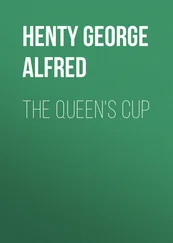George Henty - Colonel Thorndyke's Secret
Здесь есть возможность читать онлайн «George Henty - Colonel Thorndyke's Secret» — ознакомительный отрывок электронной книги совершенно бесплатно, а после прочтения отрывка купить полную версию. В некоторых случаях можно слушать аудио, скачать через торрент в формате fb2 и присутствует краткое содержание. Издательство: Иностранный паблик, Жанр: foreign_prose, Классический детектив, foreign_detective, foreign_antique, на английском языке. Описание произведения, (предисловие) а так же отзывы посетителей доступны на портале библиотеки ЛибКат.
- Название:Colonel Thorndyke's Secret
- Автор:
- Издательство:Иностранный паблик
- Жанр:
- Год:неизвестен
- ISBN:нет данных
- Рейтинг книги:4 / 5. Голосов: 1
-
Избранное:Добавить в избранное
- Отзывы:
-
Ваша оценка:
- 80
- 1
- 2
- 3
- 4
- 5
Colonel Thorndyke's Secret: краткое содержание, описание и аннотация
Предлагаем к чтению аннотацию, описание, краткое содержание или предисловие (зависит от того, что написал сам автор книги «Colonel Thorndyke's Secret»). Если вы не нашли необходимую информацию о книге — напишите в комментариях, мы постараемся отыскать её.
Colonel Thorndyke's Secret — читать онлайн ознакомительный отрывок
Ниже представлен текст книги, разбитый по страницам. Система сохранения места последней прочитанной страницы, позволяет с удобством читать онлайн бесплатно книгу «Colonel Thorndyke's Secret», без необходимости каждый раз заново искать на чём Вы остановились. Поставьте закладку, и сможете в любой момент перейти на страницу, на которой закончили чтение.
Интервал:
Закладка:
The children were tidily dressed and respectful in manner, the women bright and cheerful, and the solitary alehouse remaining had but few customers, and those few were never allowed to transgress the bounds of moderation. The Squire had a talk with the landlord a fortnight after his arrival.
“I am not going to turn you out, Peters,” he said. “I hear that you make some efforts to keep your house decently; the other two I shall send packing directly their terms are up. Whether you remain permanently must depend upon yourself. I will do up your house for you, and build a bar parlor alongside, where quiet men can sit and smoke their pipes and talk and take their beer in comfort, and have liberty to enjoy themselves as long as their enjoyment does not cause annoyance to other people or keep their wives and children in rags. I will do anything for you if I find the place well conducted; but I warn you that I will have no drunkenness. A man who, to my knowledge, gets drunk twice, will not get drunk a third time in this parish, and if you let men get drunk here it is your fault as much as theirs. Now we understand each other.”
Things once placed on a satisfactory footing, the Squire had but little more trouble, and it soon came to be understood that he was not to be trifled with, and that Crowswood was no longer a place for the idle or shiftless. Two or three of the farmers left at the termination of their year, but better men took their places, and John Thorndyke, having settled matters to his satisfaction, now began to attend more to other affairs. He had been, when he first came back, welcomed with great heartiness by all the gentry of the neighborhood; his father had been a popular man, and young Thorndyke had been regarded as a pleasant young fellow, and would in any case have been welcomed, if only because Crowswood had become a nuisance to the whole district. It was, indeed, a sort of rendezvous for poachers and bad characters, it was more than suspected that gangs of thieves and burglars made it their headquarters, and that even highwaymen found it a convenient and quiet resort.
Thus, then, the transformation effected within a few months of Mr. Thorndyke’s return caused general and lively satisfaction, and a year later he was put on the Commission of the Peace, and became one of the most regular attendants at the Bench of Magistrates. Reluctantly as he had taken up his present position, he found it, as time went on, a pleasant one. He had not been conscious before that time hung somewhat heavily on his hands, but here he had duties to perform and ample employment. His nature was naturally somewhat a masterful one, and both as a magistrate and a landlord he had scope and power of action. Occasionally he went up to London, always driving his gig, with a pair of fast trotting horses, and was known to the frequenters of the coffee houses chiefly patronized by country gentlemen. Altogether, John Thorndyke became quite a notable person in the district, and men were inclined to congratulate themselves upon the fact that he, and not the Indian officer, his brother, had come into the estate.
The idea of an old Indian officer in those days was that he was almost of necessity an invalid, and an irritable one, with a liver hopelessly deranged, a yellow complexion, and a hatred of the English climate. The fact that, instead of leaving the army and coming home at his father’s death, George Thorndyke had chosen to remain abroad and leave the estate to the management of agents, had specially prejudiced him in the eyes of the people of that part, and had heightened the warmth with which they had received his brother. John Thorndyke had upon the occasion, of his first visit to the family solicitors spoken his mind with much freedom as to the manner in which Newman had been allowed a free hand.
“Another ten years,” he said, “and there would not have been a cottage habitable on the estate, nor a farm worth cultivating. He did absolutely nothing beyond collecting the rents. He let the whole place go to rack and ruin. The first day I arrived I sent him out of the house, with a talking to that he won’t forget as long as he lives.”
“We never heard any complaints about him, Mr. Thorndyke, except that I think we did once hear from the Rector of the place that his conduct was not satisfactory. I remember that we wrote to him about it, and he said that the Rector was a malignant fellow, on bad terms with all his parishioners.”
“If I had the scoundrel here,” John Thorndyke said with indignation, “I would let him have a taste of the lash of my dog whip. You should not have taken the fellow’s word; you should have sent down someone to find out the true state of things. Why, the place has been an eyesore to the whole neighborhood, the resort of poaching, thieving rascals; by gad, if my brother George had gone down there I don’t know what would have happened! It will cost a couple of years’ rent to get things put straight.”
When the Squire was at home there was scarce an evening when the Rector did not come up to smoke a pipe and take his glass of old Jamaica or Hollands with him.
“Look here, Bastow,” the latter said, some three years after his return, “what are you going to do with that boy of yours? I hear bad reports of him from everyone; he gets into broils at the alehouse, and I hear that he consorts with a bad lot of fellows down at Reigate. One of my tenants—I won’t mention names—complained to me that he had persecuted his daughter with his attentions. They say, he was recognized among that poaching gang that had an affray with Sir James Hartrop’s keepers. The thing is becoming a gross scandal.”
“I don’t know what to do about him, Squire; the boy has always been a trouble to me. You see, before you came home, he got into bad hands in the village here. Of course they have all gone, but several of them only moved as far as Reigate, and he kept up their acquaintance. I thrashed him again and again, but he has got beyond that now, you see; he is nearly eighteen, and openly scoffs at my authority. Upon my word, I don’t know what to do in the matter.”
“He is growing up a thorough young ruffian,” the Squire said indignantly, “and one of these mornings I expect to see him brought up before us charged with some serious offense. We had to fine him last week for being drunk and making a disturbance down at Reigate. Why do you let him have money? You may have no authority over him; but at least you should refuse to open your purse to him. Don’t you see that this sort of thing is not only a disgrace to him, but very prejudicial to the village? What authority can you have for speaking against vice and drunkenness, when your son is constantly intoxicated?”
“I see that, Squire—none better; and I have thought of resigning my cure.”
“Stuff and nonsense, Parson! If the young fellow persists in his present course he must leave the village, that is clear enough; but that is no reason why you should. The question is what is to be done with him? The best thing he could do would be to enlist. He might be of some service to his country, in India or the American Colonies, but so far as I can see he is only qualifying himself for a jail here.”
“I have told him as much, Squire,” Mr. Bastow said, in a depressed voice, “and he has simply laughed in my face, and said that he was very comfortable where he was, and had no idea whatever of moving.”
“What time does he go out in the morning?” John Thorndyke asked abruptly.
“He never gets up till twelve o’clock, and has his breakfast when I take my dinner.”
“Well, I will come in tomorrow morning and have a talk with him myself.”
The next day the Squire rode up to the door of the Rectory soon after one o’clock. Mr. Bastow had just finished his meal; his son, a young fellow of between seventeen and eighteen, was lolling in an easy chair.
Читать дальшеИнтервал:
Закладка:
Похожие книги на «Colonel Thorndyke's Secret»
Представляем Вашему вниманию похожие книги на «Colonel Thorndyke's Secret» списком для выбора. Мы отобрали схожую по названию и смыслу литературу в надежде предоставить читателям больше вариантов отыскать новые, интересные, ещё непрочитанные произведения.
Обсуждение, отзывы о книге «Colonel Thorndyke's Secret» и просто собственные мнения читателей. Оставьте ваши комментарии, напишите, что Вы думаете о произведении, его смысле или главных героях. Укажите что конкретно понравилось, а что нет, и почему Вы так считаете.












